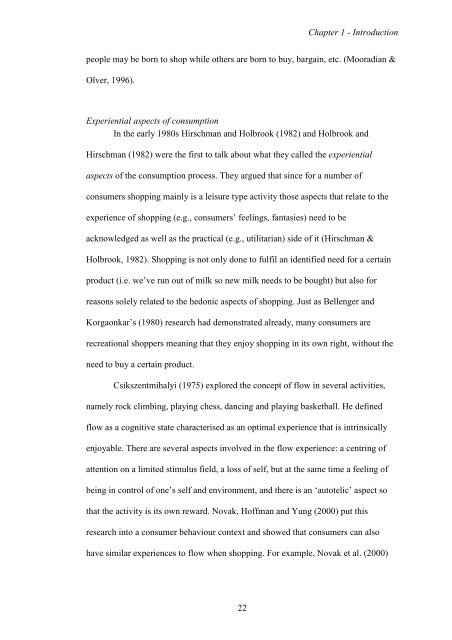CHAPTER 1 - University of Exeter
CHAPTER 1 - University of Exeter
CHAPTER 1 - University of Exeter
Create successful ePaper yourself
Turn your PDF publications into a flip-book with our unique Google optimized e-Paper software.
22<br />
Chapter 1 - Introduction<br />
people may be born to shop while others are born to buy, bargain, etc. (Mooradian &<br />
Olver, 1996).<br />
Experiential aspects <strong>of</strong> consumption<br />
In the early 1980s Hirschman and Holbrook (1982) and Holbrook and<br />
Hirschman (1982) were the first to talk about what they called the experiential<br />
aspects <strong>of</strong> the consumption process. They argued that since for a number <strong>of</strong><br />
consumers shopping mainly is a leisure type activity those aspects that relate to the<br />
experience <strong>of</strong> shopping (e.g., consumers’ feelings, fantasies) need to be<br />
acknowledged as well as the practical (e.g., utilitarian) side <strong>of</strong> it (Hirschman &<br />
Holbrook, 1982). Shopping is not only done to fulfil an identified need for a certain<br />
product (i.e. we’ve run out <strong>of</strong> milk so new milk needs to be bought) but also for<br />
reasons solely related to the hedonic aspects <strong>of</strong> shopping. Just as Bellenger and<br />
Korgaonkar’s (1980) research had demonstrated already, many consumers are<br />
recreational shoppers meaning that they enjoy shopping in its own right, without the<br />
need to buy a certain product.<br />
Csikszentmihalyi (1975) explored the concept <strong>of</strong> flow in several activities,<br />
namely rock climbing, playing chess, dancing and playing basketball. He defined<br />
flow as a cognitive state characterised as an optimal experience that is intrinsically<br />
enjoyable. There are several aspects involved in the flow experience: a centring <strong>of</strong><br />
attention on a limited stimulus field, a loss <strong>of</strong> self, but at the same time a feeling <strong>of</strong><br />
being in control <strong>of</strong> one’s self and environment, and there is an ‘autotelic’ aspect so<br />
that the activity is its own reward. Novak, H<strong>of</strong>fman and Yung (2000) put this<br />
research into a consumer behaviour context and showed that consumers can also<br />
have similar experiences to flow when shopping. For example, Novak et al. (2000)
















